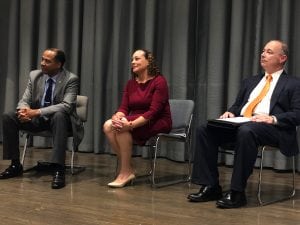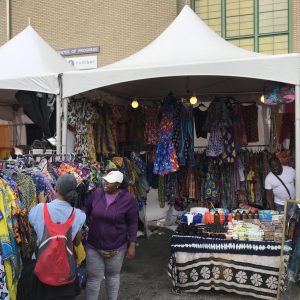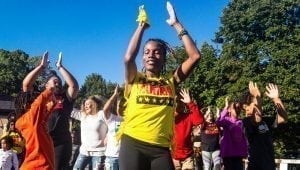MSNBC’s Hugo Balta speaks on the power of diversity in the media
MSNBC's Hugo Balta speaks on the power of diversity in the media
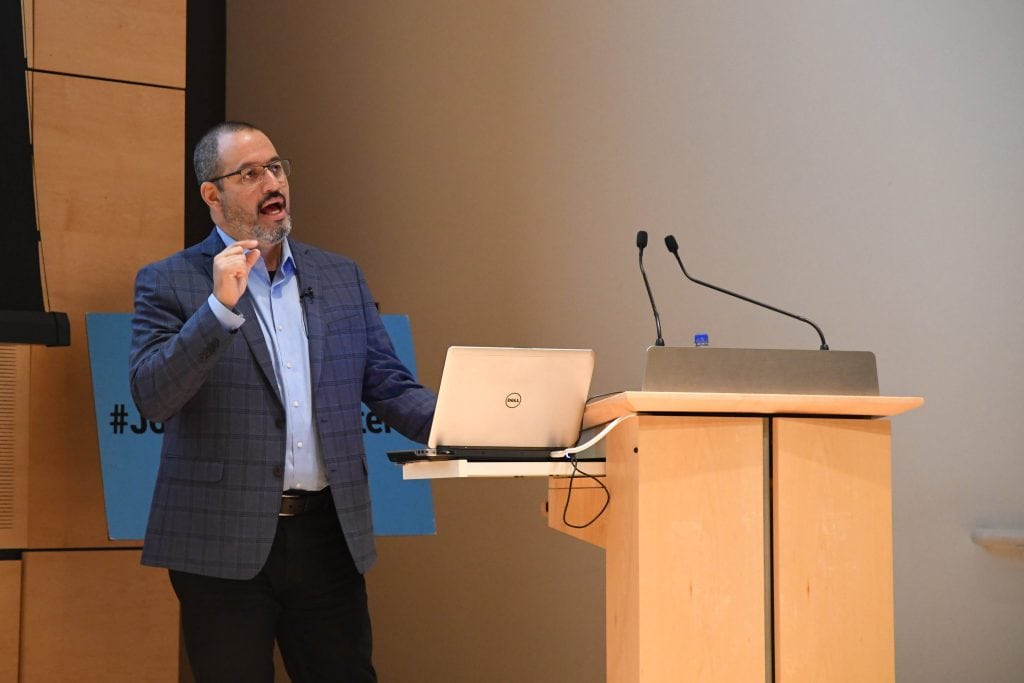
Images of Darth Vader and Luke Skywalker appeared on the screen with the question, “Hero or villain?” The answer depends on the narrative told about the characters and the images portrayed, said MSNBC Senior Producer Hugo Balta.
“Image is very important in this media, regardless of platforms,” Balta said. “Images are what shapes how we as consumers of news information think about different communities and stories.”
Balta spoke about “The Power of Diversity in the Media” in Joyce Hergenhan Auditorium Monday as part of the Leaders in Communications Speaker Series. Hub Brown, Newhouse associate dean for research, creativity, international initiatives and diversity, introduced Balta as “a leader and entrepreneur who is at the forefront of activities concerning diversity, inclusion and the future of journalism.”
Balta oversees the editorial and production vision and execution of shows at MSNBC, where he is also a member of the NBC/MSNBC Editorial Board. Balta is also a two-time president of the National Association of Hispanic Journalists and was inducted into the Hall of Fame in 2016.
Balta began his presentation speaking about how journalists’ implicit biases influence the way stories are framed.
“98 percent of our decision making is made on bias, which is based on factors like education, upbringing, ethnicity and socioeconomic background,” Balta said. “If 98 percent is automatic, we have a long way to go in introspect of how we as journalists are consuming media.”
Balta said understanding his own biases allows him to do a better job of surrounding himself with people who have different perspectives so they can engage in discussion about the focus of what they are going to cover.
He said the media’s portrayal of certain communities shapes the public perception reality. Typically, Balta said, the media reinforces a negative narrative about the immigrant community, as seen in our current presidential administration.
“Over time, the repetition of the negative narrative of the immigrant community and in association the Hispanic and Latino community becomes our reality,” Balta said.
In today’s media, immigrants seeking asylum in the United States are commonly referred to as “illegals, illegal aliens and invaders,” Balta said. “The use of illegals, illegal aliens and invaders is used to take away the power and voice of a community that is centered in a lot of the political debate.”
Balta said that the current administration has provided more than 13,000 instances of misinformation, many of which concern the immigrant community. These instances of misinformation occur because President Donald Trump is not concerned with the truth but rather the repetition of the narrative he is providing to the public, Balta said.
“He understands that he is going to be retweeted and shared by his base, and his competitors who disagree with his ideology are going to do the same because they are criticizing his position,” Balta said. “But what he cares the most about is the repetition because that is how we learn.”
Journalists have to combat this misinformation in their storytelling, which starts with considering their own biases, Balta said.
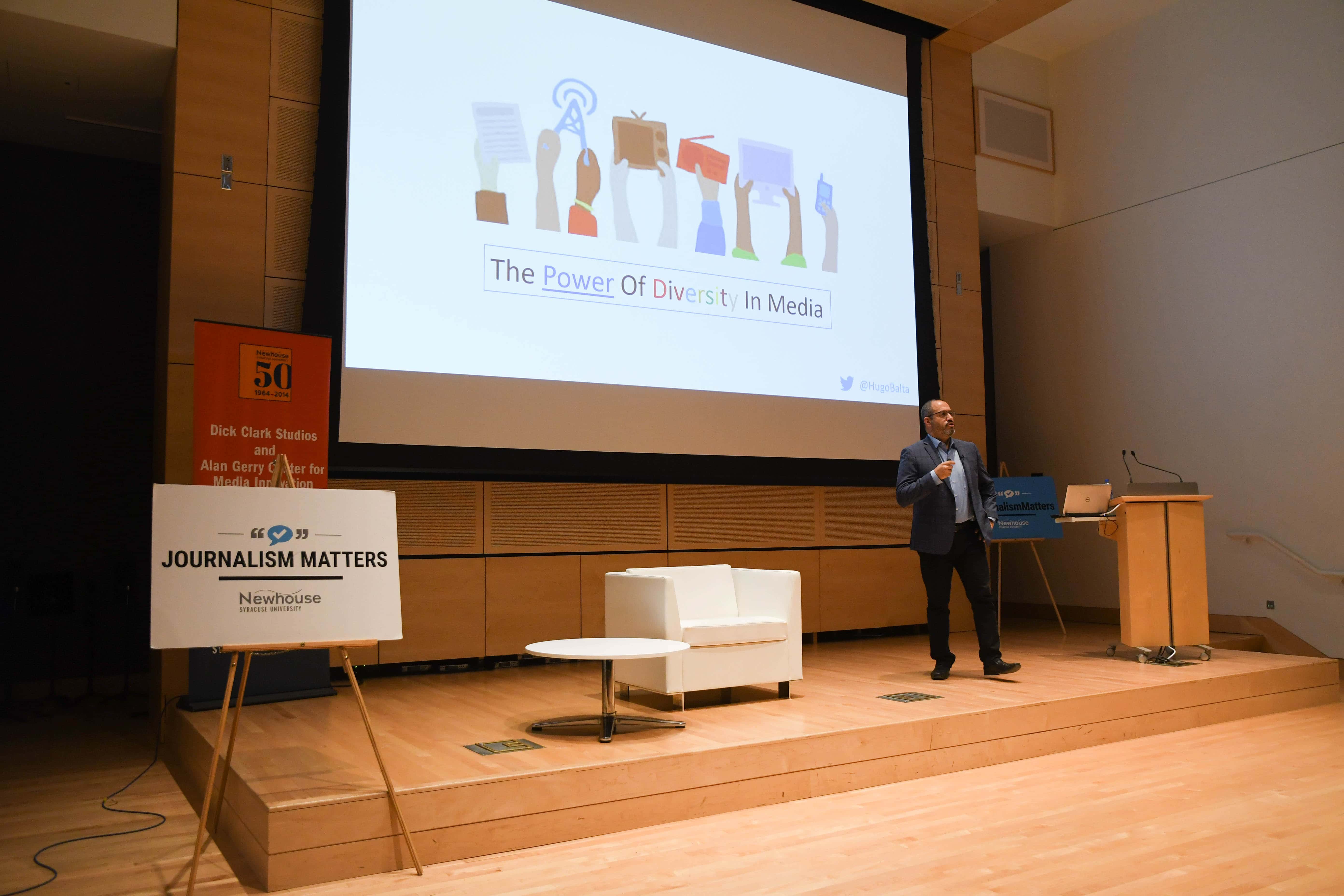
“Often times when we hear diversity, we think of race, gender and ethnicity,” Balta said. “We don’t think often enough about the things we don’t see that are still part of this—experience, interest, sexual orientation, political and religious ideology, amongst others.”
In order to accurately and fairly tell stories about a community, journalists need to educate themselves about the community, which is acquired diversity, Balta said.
“In being fair and accurate,” Balta said, “You have to do a better job of connecting with people that you are going to come cross, that you’re going to be producing sorties about, that you’re going to be serving. Seeking truth will be more fulfilling than just getting both sides.”
Balta ended his presentation by giving advice to the audience of aspiring journalists.
“All of you have distinct perspective based on who you are,” Balta said. “But in telling stories, you need to ensure that it is always about who we are as a community. It’s about being the bridge builders, bringing people together and focusing on common ground.”
Newhouse graduate student Cindi Edwards said, “Getting it through the lens of a journalist was really interesting. Balta gave a good perspective about bridging communities, which was a great takeaway.”

